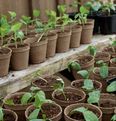 Haven Homestead is what some folks like to call a "hobby farm." It may be a hobby farm on steroids, or we may call it something like a "lifestyle farm" or homestead, or something more appropriate, but whatever we call it, it wouldn't be a sustainable if we didn't have some way to pay for it. Hence, we have embarked on the Great Luffa Experiment. We are very conscious of how we spend our money, as we should be. We like to grow a garden, raise chickens, rabbits, goats, cats and a dog, On top of that, we want to build a barn/shop, and we are looking to expand our lodgings for Airbnb guests and WWOOFers. Everything costs money, and we like to set ourselves up for success by finding ways for these things to "earn" their keep. After we finished the house, we rented our extra room and camper out on Airbnb. Airbnb paid for our property taxes last year. Rabbits are one of the first crops we began to raise here on the homestead. Rabbit meat is a very healthy meat, which we like to eat. Plus, rabbits make lots and lots of really great fertilizer, which we use in the garden. We teach classes 3 or 4 times a year on how to raise and process meat rabbits. We occasionally sell the meat to interested parties, and we are working on developing more products to sell (like rabbit feet key chains and cat toys made from the pelts). As of right now the rabbits pay for themselves for most of the year, and as we move forward with product development, they will eventually pay for themselves and then some. Rabbits are a cash crop for us. There are a few of our hobbies, for lack of a better word, that do not pay for themselves; the cats and dog, to name two. They earn their stay by keeping pests at bay and giving us companionship. We occasionally sell kittens, but they don't really pay for themselves. In order to keep this place sustainable, I have been looking for another cash crop. Something that we can grow or raise that takes very little input which will pay for itself and a few more of our other operations. When I saw luffa seeds in a plant catalog last year, I did some research. It did not take long for me to see the benefits of growing luffa. Luffa is kind of two products in one. Also known as dishcloth gourd, it is a great natural way to scrub dishes and bodies. When it is young, it is edible and is prized in Japan for its taste and texture. If you've got the right climate, it's not difficult to grow, and they are supposed to be prolific producers. I personally know some soap makers to whom I could wholesale my luffas, not to mention it would be cool to grow my own sponges! I have since decided that I want to be a luffa farmer. I know that my zone is at the edge of being unsuitable for growing luffa's. However with season extenders like row covers and grow lights, I think we should be able to grow a small crop of these wonderful plants. At least I hope so. As always, I will do my best to share our results, but in the meantime, do you have a cash crop? If you do, what do you do to track and monitor your crop? If not, what will you choose for your cash crop?
3 Comments
Hannah
7/6/2019 06:37:45 pm
I just discovered your podcast! Are you guys not posting anymore?
Reply
Leave a Reply. |
Lindsay Hodge
Lindsay Hodge is our resident Writer here at Haven Homestead. She keeps this blog, a GRIT blog, and writes other fun things too. Categories
All
Archives
May 2018
|


 RSS Feed
RSS Feed
